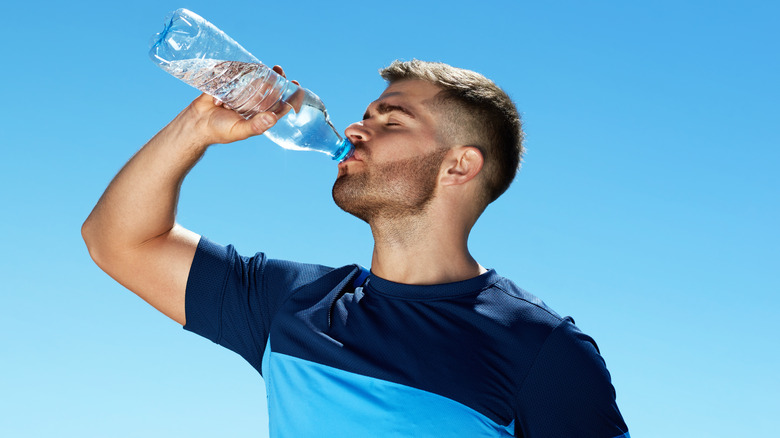Drinking Only Water Might Be Bad For You. Here's Why
Given the constant reminders about how water is essential to the body and how important it is to drink water every day to support good health, it may seem impossible that drinking only water could be bad for you. But as it turns out, drinking only water over a period of time could indeed cause certain health problems.
One issue that can result from drinking only water is overhydration, also known as hyponatremia (per Real Simple). "The signs and symptoms of overhydration are the result of our electrolytes being diluted," Natasha Trentacosta, a sports medicine specialist and orthopedic surgeon at Cedars-Sinai Kerlan-Jobe Institute in Los Angeles, tells Real Simple. Dr. Trentacosta points out that hyponatremia is commonly seen in athletes because they want to avoid becoming dehydrated. "Hyponatremia may present with lethargy or altered mental status as the brain is sensitive to sodium levels in the blood," Dr. Trentacosta says.
People with kidney disease may also be at increased risk of hyponatremia because of their organ's inability to control the body's water levels, but even those without kidney issues can drink too much water for their kidneys to handle. "Kidneys can excrete up to 28 liters of fluid in a day, but only one liter an hour," Christina Lang, internal medicine and pediatric physician at UCHealth in Fort Collins, tells Real Simple, adding, "Drinking more than this can lead to water intoxication and electrolyte imbalances." According to Dr. Lang, some symptoms of overhydration to look out for include "confusion, disorientation, nausea, and vomiting."
Is it safe to go on a water diet?
Though over-consuming water can potentially lead to certain health issues, what happens if you consume nothing but water? According to Today, some people are turning to so-called "water diets" as a way to shed pounds quickly. A water diet sounds like what it is — a diet where you only drink water throughout the day. After a few days, you can consume small amounts of fruits and vegetables once you begin to lose some weight. But is a water diet technically a "diet?" Health experts don't see it that way.
"It's just another name for fasting," Julie Upton, registered dietitian and co-founder of Appetite for Health, told Today. Upton went on to say that it won't hurt if you fast for only a few days, but if you're looking to lose weight in a healthy way, it's not the best approach. And chances are, you'll just end up putting the pounds right back on. "You'll be so hungry and just revert back to your normal eating patterns after trying this and you'll gain any weight that you lost," Upton says. And fasting does pose some risks, according to Upton, such as depriving the body of key nutrients and loss of muscles mass. She suggests that rather than going on a fad diet to lose weight that you instead "cut out lazy calories (added sugars, saturated fats) and exercise," if you want to maintain a healthy weight and sense of wellbeing in the long run.


